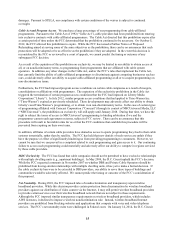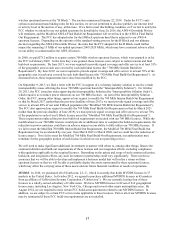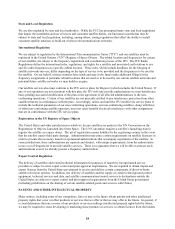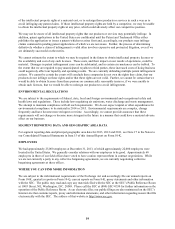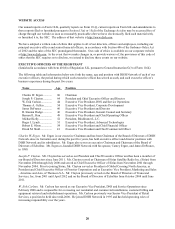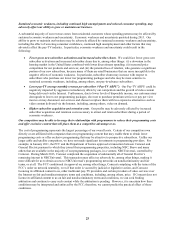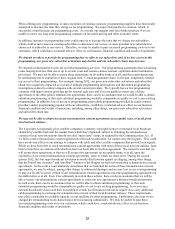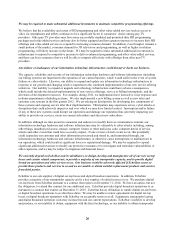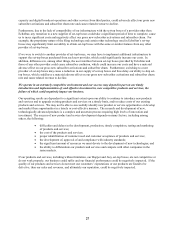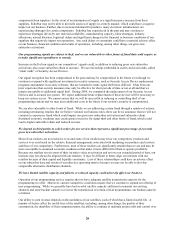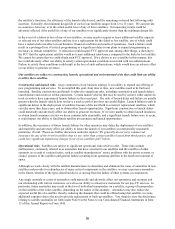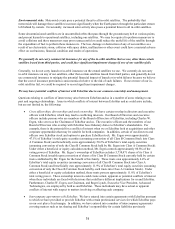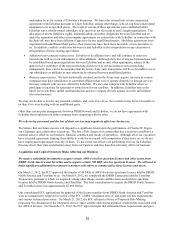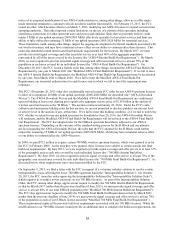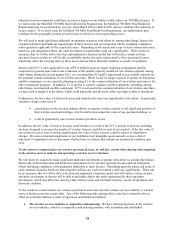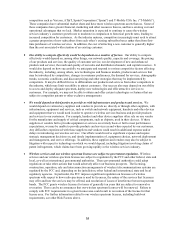Dish Network 2013 Annual Report Download - page 35
Download and view the complete annual report
Please find page 35 of the 2013 Dish Network annual report below. You can navigate through the pages in the report by either clicking on the pages listed below, or by using the keyword search tool below to find specific information within the annual report.25
25
When offering new programming, or upon expiration of existing contracts, programming suppliers have historically
attempted to increase the rates they charge us for programming. We expect this practice to continue, which, if
successful, would increase our programming costs. As a result, our margins may face further pressure if we are
unable to renew our long-term programming contracts on favorable pricing and other economic terms.
In addition, increases in programming costs could cause us to increase the rates that we charge our subscribers,
which could in turn cause our existing subscribers to disconnect our service or cause potential new subscribers to
choose not to subscribe to our service. Therefore, we may be unable to pass increased programming costs on to our
customers, which could have a material adverse effect on our business, financial condition and results of operations.
We depend on others to provide the programming that we offer to our subscribers and, if we lose access to this
programming, our gross new subscriber activations may decline and our subscriber churn may increase.
We depend on third parties to provide us with programming services. Our programming agreements have remaining
terms ranging from less than one to up to several years and contain various renewal, expiration and/or termination
provisions. We may not be able to renew these agreements on favorable terms or at all, and these agreements may
be terminated prior to expiration of their original term. Certain programmers have, in the past, temporarily limited
our access to their programming. For example, during 2012, our gross new subscriber activations and subscriber
churn were negatively impacted as a result of multiple programming interruptions and threatened programming
interruptions related to contract disputes with several content providers. We typically have a few programming
contracts with major content providers up for renewal each year and if we are unable to renew any of these
agreements or the other parties terminate the agreements, there can be no assurance that we would be able to obtain
substitute programming, or that such substitute programming would be comparable in quality or cost to our existing
programming. In addition, loss of access to programming, particularly programming provided by major content
providers and/or programming popular with our subscribers, could have a material adverse effect on our business,
financial condition and results of operations, including, among other things, our gross new subscriber activations
and subscriber churn rate.
We may not be able to obtain necessary retransmission consent agreements at acceptable rates, or at all, from
local network stations.
The Copyright Act generally gives satellite companies a statutory copyright license to retransmit local broadcast
channels by satellite back into the market from which they originated, subject to obtaining the retransmission
consent of local network stations that do not elect “must carry” status, as required by the Communications Act. If
we fail to reach retransmission consent agreements with such broadcasters, we cannot carry their signals. This could
have an adverse effect on our strategy to compete with cable and other satellite companies that provide local signals.
While we have been able to reach retransmission consent agreements with most of these local network stations, from
time to time there are stations with which we have not been able to reach an agreement. We cannot be sure that we
will secure these agreements or that we will secure new agreements on acceptable terms, or at all, upon the
expiration of our current retransmission consent agreements, some of which are short-term. During the second
quarter 2012, the four major broadcast television networks filed lawsuits against us alleging, among other things,
that the PrimeTime Anytime™ and AutoHop™ features of the Hopper set-top box breach their retransmission consent
agreements. In the event a court ultimately determines that we breached the terms of these retransmission consent
agreements, we may be subject, among other things, to substantial damages and we may lose access to programming
or may not be able to renew certain of our retransmission consent agreements and other programming agreements on
favorable terms or at all. Even if we ultimately prevail in these actions, there can be no assurance that we will be
able to renew our retransmission consent agreements or enter into new agreements with these broadcast networks.
In such event, there can be no assurance that we will be able to obtain substitute programming, or that such
substitute programming would be comparable in quality or cost to our existing programming. In recent years,
national broadcasters have used their ownership of certain local broadcast stations to require us to carry additional
cable programming in exchange for retransmission consent of their local broadcast stations. These requirements
may place constraints on available capacity on our satellites for other programming. Furthermore, the rates we are
charged for retransmitting local channels have been increasing substantially. We may be unable to pass these
increased programming costs on to our customers, which could have a material adverse effect on our business,
financial condition and results of operations.


